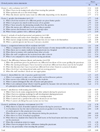Abstract
Purpose
The purpose of this study was to identify the conceptual structure of stressors experienced by nursing students during clinical practice.
Methods
Ten men and 10 women nursing college students were interviewed. The results were 208 ideas. By synthesizing and editing these ideas, the final statement was trimmed down to 39 questions. The next step was to have the participants classify these 39 final questions. They were asked to rate stress scores using a five-point scale. Through multidimensional scaling analysis and hierarchical cluster analysis yielded dimensions and clusters.
Results
Results of the study showed 2 dimensions which were classified as 'interpersonal relationship-practice system' and 'identity-practice environment'. It also yielded 8 clusters which were classified as 'role confusion', 'gender discrimination', 'attitudes of medical personnel and patients', 'comparison between fellow students', 'difference between theory and practice', 'disestablishing the role of practice guide', 'interference with training', and 'problems of the practice environment'. Further, stress factors and stress levels were differentiated depending on the gender of the student.
Figures and Tables
References
1. American Association of Colleges of Nursing. The essential clinical resource for nursing academic missions [Internet]. Washington. DC: American Association of Colleges of Nursing;2008. cited 2014 March 17. Available from: http://www.aacn.nche.edu/education-resources/clinicalessentials99.pdf.
2. Korean Accreditation Board of Nursing Education. Accreditation manual with interpretive guidelines for four-year nursing programs [Internet]. Seoul: Korean Accreditation Board of Nursing Education;2012. cited 2014 April 17. Available from: http://kabon.or.kr/kabon02/index04.php.
3. Korean Nurses Association. Plan for improving the nursing education system quality for nurse workforce [Internet]. Available from: http://webzine.koreanurse.or.kr/Webzine/read_article.php?webzine_id=36&sub_cat_id=401&is_sub_no=633&article_id=883.
4. Korean Nurses Association. The number of nursing schools and hospitals [Internet]. Seoul: Korea Nurses Association;2014. cited 2014 April 20. Available from: http://www.koreanurse.or.kr/board/board_read.php?board_id=research&member_id=admin&exec=&no=4&category_no=&step=0&tag=&sgroup=4&sfloat=&position=0&mode=&find=&search=.
5. Song JH, Kim MW. Study on clinical education for nursing in hospitals in Korea. J Korean Acad Soc Nurs Educ. 2013; 19(2):251–264. http://dx.doi.org/10.5977/jkasne.2013.19.2.251.
6. Lee HS, Kim EJ. The comparison of stress coping and satisfaction with clinical practice according to the grade of nursing college student. J East West Nurs Res. 2008; 14(1):5–13.
7. Kim SL, Lee JE. Relationship among stress, coping strategies, and self-esteem in nursing students taking clinical experience. J Korean Acad Soc Nurs Educ. 2005; 11(1):98–106.
8. Whang SJ. The relationship between clinical stress, self-efficacy and self esteem of nursing college students. J Korean Acad Soc Nurs Educ. 2006; 12(2):205–213.
9. Yang NY, Moon SY. Relationship of self-leadership, stress and satisfaction in clinical practice of nursing students. J Korean Acad Nurs Adm. 2011; 17(2):216–225.
10. Jeong SH, Park SH. Relationship among stress, depression, and satisfaction to clinical practice among nursing students. Korean J Rehabil Nurs. 2013; 16(1):47–54. http://dx.doi.org/10.7587/kjrehn.2013.47.
11. Kim HS. A study on relationship between stress of clinical practice and clinical competency in nursing students. J Korean Acad Public Health Nurs. 2002; 16(1):64–76.
12. Kim IS, Jang YK, Park SH, Song SH. Critical thinking disposition, stress of clinical practice and clinical competence of nursing students. J Korean Acad Soc Nurs Educ. 2011; 17(3):337–345. http://dx.doi.org/10.5977/JKASNE.2011.17.3.337.
13. Kim JS. The influence of ego-resilience and stress of clinical practice on clinical competence in nursing students. Korean J Health Commun. 2012; 7(2):94–102.
14. Lee JW, Eo YS. Effect of clinical stress and stress coping on college adjustment in nursing students. Korean J Health Serv Manag. 2013; 7(2):125–134. http://dx.doi.org/10.12811/kshsm.2013.7.2.125.
15. Park IS, Kim CS, Kim R, Kim YJ, Park MH. Stress, anxiety and fatigue of nursing students in clinical practice. J Korean Acad Soc Nurs Educ. 2005; 11(2):151–160.
16. Kim AJ, Moon JH. Relationship of clinical practice stress, fatigue and Yangsaeng in nursing student. Nurs Sci. 2012; 24(2):31–38.
17. Kim SH. Pass over the one thousand man students at the national nurse licensing examination [Internet]. The Korean Nurses Association News;2013. cited 2014 April 17. Available from: http://www.nursenews.co.kr/Article/ArticleDetailView.asp?typ=3&articleKey=1455.
18. Park MA. Self-leadership, stress on clinical practice, and stress coping styles in nursing students [master's thesis]. Daegu: Kyungpook National University;2009.
19. Lee AK. Influencing factors of nursing students in clinical practice stress [master's thesis]. Gwangju: Chonnam National University;2013.
20. Hong SS, Hong JA, Jun WH. Spirituality and stress of clinical practice among nursing students. J Korea Contents Assoc. 2013; 13(6):361–369. http://dx.doi.org/10.5392/JKCA.2013.13.06.361.
21. Lee EJ, Jun WH. Sense of coherence and stress of clinical practice in nursing students. J Korean Acad Soc Nurs Educ. 2013; 19(2):163–171. http://dx.doi.org/10.5977/jkasne.2013.19.2.163.
22. Han SH, Yu HS. College women's self-leadership, stress of clinical practice and self disclosure in an area. J Korean Acad Soc Nurs Educ. 2012; 18(1):131–140. http://dx.doi.org/10.5977/jkasne.2012.18.1.131.
23. Whang SJ. Development and verification of a tool for the nursing students' clinical stress. J Margaret Pritchard Coll Nurs. 2002; 14(1):35–54.
24. Kane M, Trochim WMK. Concept mapping for planning and evaluation. Thousand Oaks, CA: Sage;2007. p. 27–110.
25. Giorgi A. Sketch of a psychological phenomenological method. In : Georgi A, editor. Phenomenology and psychological research. Pittsburgh, PA: Duquesne University Press;1985. p. 12–18.
26. Lee HJ. A study on the caregiving experience of the husband who are caring for spouses with Alzheimer in an elderly couple household: with Giorgi's phenomenological research method [dissertation]. Seoul: Ewha Womans University;2005. 29–34.
27. Park SJ, Park BJ. Relationship of clinical practice stress to clinical competence among one college nursing students. Korean J Stress Res. 2013; 21(4):313–322.
28. Lee MA, Shin YJ, Park JS, Kwon SS, Kwon SJ, Kim SJ, et al. A comparative study of the stress that is perceived by nursing students and nurses in clinical nursing education. J Korean Acad Nurs Adm. 2003; 9(1):51–61.




 PDF
PDF ePub
ePub Citation
Citation Print
Print





 XML Download
XML Download